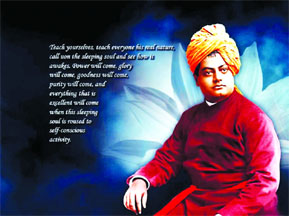
Swami Vivekananda, a spiritual leader, had a deep insight into modern education and spiritual learning; in simple words, he emphasized the blending of modern education with Indian spirituality.
Vivekananda was a firm believer in education as a tool for human advancement. His speeches and writings are replete with references to the plight of the masses as a result of the denial of literacy and education to them. He was particularly shocked by the degree of ignorance and superstition prevalent in rural regions due to a lack of literacy and education. He was also harshly critical of the educational system, citing its western slant and a lack of focus on the development of mental capacity and moral character in its students. In addition, he advocated for the universalization of literacy, development, and mass education. He desired a comprehensive reorientation of the educational system to make it an integrated man-making and character-building system, with a focus on national pride, love for the masses, self-confidence, strength, and will power, and cultivation of the intellect rather than simple recollection.
Swami Vivekananda’s scheme of youth education is comprehensive education that aims to develop body, mind and soul from a socio-economic perspective, which destroys inequality between men and women, casteism and communalism, ethnic and sub-national, regionalism and national differences. When he speaks of ‘body’, he lays stress on physical training, good living conditions, a balanced diet, in a word, complete satisfaction of all physical hunger. All of this is possible only when the youth are employed and earning a stable income. For this, youth need to develop agriculture with the help of Western technology, and the promotion of small-scale and cottage industries with the use of financial assistance from the state to become “Atmanirbhar”.
Youth must have sound mental health, “Be strong my young friends, that is my advice to you. You will be nearer to heaven through football than through the study of the Gita”. This line reflects a story when a young lad visited Swamiji and asked him to teach meditation. He says, go and play, do some physical exercise, and then I will teach you. He always promotes the physical well-being of youth, as it’s a focus proverb – healthy mind stays in a healthy body. He wants youth to be as soft as Krishna playing the flute and as masculine as Hanuman.
Vivekananda believes in the dispersion of positive thoughts and values among the youths; he says: “If you can give them positive thoughts, then people will grow up to be a man and learn to stand on their own legs”.
That’s why in the present time, it is necessary to empower the weakest, most neglected and degraded societies’ youth so that they can contribute to nation-building. Only positive education can do that; however, if seen in the name of empowerment, youths are divided into all sorts of instruments that promote negative thought processes (hatred and enmity between different groups) that are baked inside the universities and schools. As a result, it creates disharmony and conflict, so youth must try to believe in solidarity and cohesion.
Swamiji says, “Religion deals with the truths of the metaphysical world just as chemistry, and the other natural sciences deal with the truths of the physical world”. Youth should try to read and learn basics from ‘The book of Nature’, i.e. Chemistry and Physics. In modern times youth are often ignorant of technological sciences too as they are busy reading the wrong book, i.e. ‘The book of passing marks’. At the same time, techno-geek youth are often ignorant of religion and its dimensions. They too read the wrong books, i.e. ‘The book without interior knowledge’. The book from which religiosity can be learned is the youth’s mind and heart.
While speaking of ‘mind’, Swamiji laid stress on discipline, fearlessness, passion for helping others, commitment to human and social values and a continuous effort to realise oneself through social service and meditation. The final stage of education lies in the elevation of the body and mind up to the ‘soul’ when there is the realization of ‘Universal Unity’. So physical and mental stages of the educational curriculum end in the spiritual step. This spiritualism is the final identity of a layman and woman and not that of a monk and seer only. So it is ‘Practical Vedanta’. We notice a two-way dynamic process here: One, is essentially inward, and the other is entirely social. This blending of the two in a harmonious fashion has been possible through a synthesis of religion and philosophy.
Character Education
Education is a building block of character. It is not gathering or absorbing knowledge; it is the encapsulation of good values. Character imparts wisdom which results in attaining enlightenment. And the goal of life should be unselfishness and living for others. Life is all about sacrifice. He always connects to youths by: “This life is short, the vanities of the world are transient, but they alone live who live for others, the rest are more dead than alive”. Our life is merely a collection of good or bad habits; these habits enterprise characters as a personality that societies continuously monitor and reflect an impression of oneself. In the 21st century, the modern economic and education system has created an environment of stress, so inculcating one good thought and habit, rather than having dozens of thoughts, and trying to implement it in one’s own life is the best method of achieving enlightenment.
Right Education
Right education is critical for youths, as we have been colonised for more than 200 years, creating a mindset of slavery. Swamiji says during his interaction: “Getting by heart the thoughts of others in a foreign language and stuffing your brain with them and taking some universities degree, you consider yourself educated”. As rote learning and sluggish thinking do not produce the mind that a developing nation requires. Such educated youth are a burden on society. They even cannot earn a decent living for themselves and their family. Unskilled youth start depending on the government dole, and the process of man-making gets hampered.
Science and Religion
Swami Vivekananda always mentions that: “Science is nothing but the finding of unity”. Once science reaches the state of unity, further progress would stop as it would have reached its goal. ‘Chemistry’ would not progress further when it has discovered a single element out of which others can be made. Progress of ‘Physics’ stops when it finds a single source of energy out of which all the others are made; the manifestation of science and religion becomes unity when the manifestation of unity will discover the ‘God’; who is the only ‘divine’, living in the universe of mortals. The one who is constant in a mortal and ever-changing world is only “Him”. The One “Him” who is the only soul out of which all souls are made the concept of universal religion takes place. Any mischievous manifestations of “Him” will be disastrous for youth and the nation.
After accumulating the above-mentioned qualities comes a part of religion. Once a youth is physically strong and emotionally intense, then they can preserve the realisation of universal religion where Vedanta and the evolution of peaceful religion can be promoted. This religion is distinct from dogmas, rituals and misconceptions of knowledge. Swamiji believes in religious pluralism with scientific temperament, where Western understanding of science is taught in college and religion at home, society and religious institutions. However, he never wants youth to convert to another religion, and practice the path of Dharma from the eyes of Vedanta.
Thus, education is a man-making process rather than a life-destroying enterprise; with the right education, characters are built, which help to counter bad habits. For youth, education is not only the development of character but also develops leadership qualities and personalities.
The youth must advocate for the entire development of physical, mental, emotional, leadership qualities and religiosity which was once the idea of the education system of Vishwaguru. The principle of ‘Vasudhaiva Kutumbakam’, with the blending of modern technology and man-making, must be focused on youth to contribute to nation-building.
Source: Indica Today





Be the first to comment